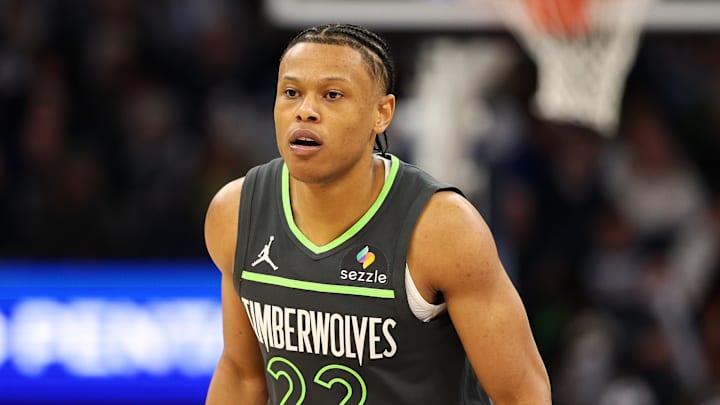One of the more underrated parts of the Minnesota Timberwolves’ summer league was the play of Jaylen Clark. The second-year wing struggled offensively, averaging 8.3 points and 2.5 assists with shooting splits of 30.6/30.4/50 across four games. Nevertheless, he remained impactful as a defender both on and off the ball. Notably, he averaged 2.5 steals and often guarded the opposing team's best player.
Heading into the summer league, Clark’s role seemed clear as the Wolves' 10th man. While it’s only the summer league, this now feels solidified with Terrence Shannon Jr. and Rob Dillingham above him in the pecking order.
Clark will be a deep rotational player for the Wolves
Chris Finch has discussed expanding the Wolves' rotation to play 9 to 10 guys. Of course, Naz Reid and Donte DiVincenzo are above Clark. Shannon and Dillingham similarly seem to be above Clark as well. Still, as an energy guy off the bench who plays limited minutes yet provides hard-nosed perimeter defense, Clark has a clear role with the Wolves. This role perfectly suits Clark’s defensive acumen.
In certain matchups, if injuries or if Clark shines in his minutes, he could play a bigger role. Nevertheless, to start the season, it’s clear that Clark will play some spot minutes in a limited role. This past season, Clark averaged 13.1 minutes, 4.1 points, 1.3 rebounds, and 0.7 assists with 46.7/43.1/78.4 shooting splits. However, he also got a fair share of DNPs and fell out of the Wolves’ rotation in the playoffs, appearing in just five games, averaging 5.6 minutes. Clark’s role will likely look something similar to his rookie season.
While losing Nickeil Alexander-Walker will open up minutes, the Wolves are likely to prioritize Shannon and Dillingham over Clark. Shannon’s scoring and versatility make him ready for a bigger role. Dillingham’s blend of shot-creation and playmaking fills a key need for the Wolves. Both players also have higher ceilings than Clark.
Regardless, Clark will still provide value to the Wolves, especially as a defender. His 3-point shooting will be crucial in determining if Clark plays a bigger role. He shot 43.1 percent from beyond the arc as a rookie. However, Clark struggled as a shooter during the summer league, netting just 30.4 percent of his shots from beyond the arc, and was a 30.2 3-point shooter in college. If Clark’s shooting translates and other factors go his way, he could exceed his expected role.
Ultimately, while Clark’s role projects to be limited, this upcoming season, he’ll still make a positive impact in his minutes.
